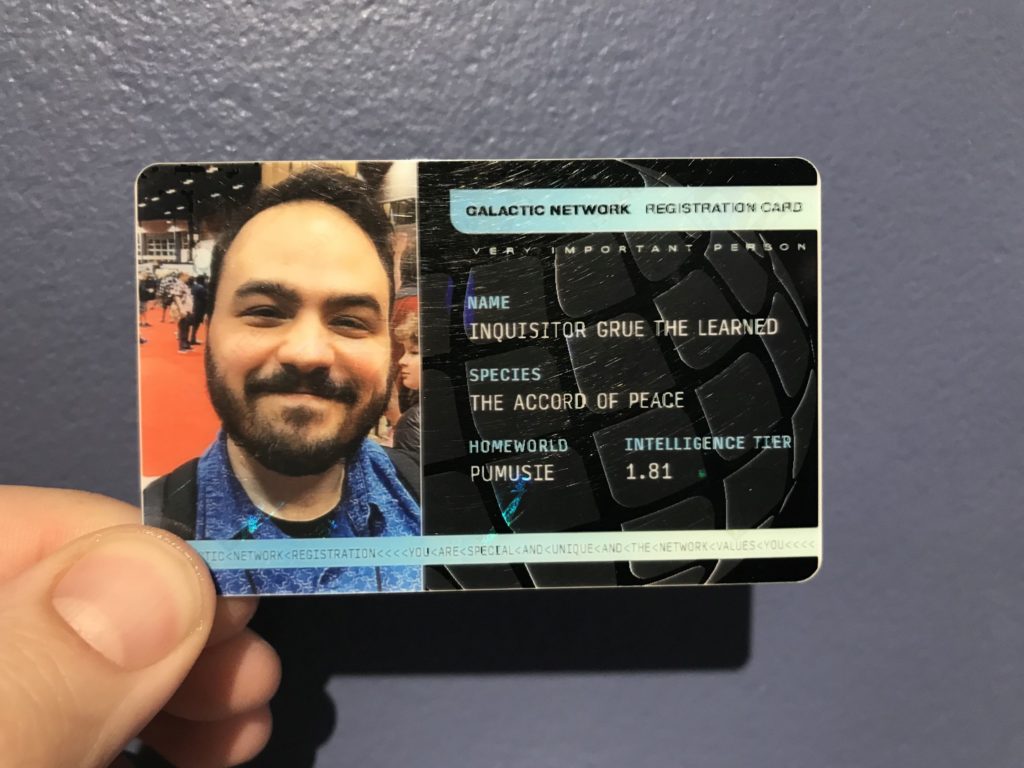
Last year was the first time I actually went to a panel on writing. Chicago Comics and Entertainment Expo is a comic-con, rather than a professional one, but they had acquired some impressive names, such as Mary Robinette Kowal and Cory Doctorow, among others (both of whom are absolute rock stars by the way). This time around the stable was even larger, with people such as John Scalzi, Terry Brooks, and Sam Sykes, as well as a number of first-time authors like K.M. Szpara and Chris Kluwe, and a serious presence of the Horror and Young Adult variety, spearheaded by Joe Hill and Rainbow Rowell respectively.
I focused on the SFF panels, which took the biggest chunk of my convention weekend, and it was an energizing (and a tiny bit frustrating) experience. Despite the well thought out panel topics, the actual result seemed to always amount to “writers talking about writering”, which I totally loved. And listening to people you admire share their experiences in the field you ascribe to, helps tremendously to humanize and demystify said field.

On the other hand, having people talk about living your life’s dream when you sometimes feel so far away from achieving it, can be a bit depressing (beer helps with that, by the way). More than anything though, it paints in stark colors the simple fact that the steps to traditional publishing are very simple, very accessible, and each one requires tremendous amounts of work, patience, and determination. There are no short cuts. But in its own way, this is motivating as well.
Some highlights:
K.M. Szpara and the importance of being earnest. Even among a group as diverse as the panels at C2E2 offered, Szpara stood out to me, and not only because I had practically just finished his book (or because, I was somehow the fanboy who got to be his first signee). He approached both of his appearances (“Tor Presents: Chaos and Cosmos” and “The Devil You Know”) with a mixture of thoughtfulness and passion that really resonated with me. An awareness of the current field, mixed with an impish attitude that I, in my rigid glory, can only admire from a distance. Plus, raising awareness of the important issue of whether Dolores Umbridge would make a good dom.

One thing that stuck with me was his advice on approaching fiction writing with the abandon of a fanfic writer. No fear of censorship, no need to worry about market or reception. It is a constant struggle and a subject of endless second-guessing for me, trying to determine whether I write a certain way because I want to, or because I think that’s how it’s “supposed” to be written. It was refreshing to hear someone who has achieved success vouch for the former. And though of course one can’t just ignore all external factors when pursuing traditional publishing, it is a nice reminder all the same that ultimately you write better when your primary drive isn’t worry about what the market might expect.
Zack Jordan and the value of showmanship. Zack appeared on only one panel – “Authors on ‘The Best Advice I Ever Got’” – which makes sense, considering his first book, The Last Human, is not even out yet (it is scheduled for late March). That particular panel quickly became a conversation about editing and author reaction thereof, and Jordan made the very important point that if you are trying to get published and sell your work for moneys, then you are no longer writing just “for yourself”. And the editor is the person whose job is to champion the book, not stifle the author, provided of course that the two are a good fit.
What was interesting to me about him though, was not the panel, but rather his booth on the main floor, glued to the Del Rey stand. Jordan, who has background in tech (one assumes) startups had set up a whole performance installation where he and a couple of other dudes in jumpsuits were “scanning” the crowd for potential humans, and issuing honest-to-Cthulhu, printed on the spot ID cards of your actual race, with picture and everything. Beyond the fourth wall, he was also handing out advance reading copies of The Last Human, and when I questioned him about the whole thing, he told me that Del Rey had provided the booth space, and he had set up everything else, from his helpers, to the card printers, the scanning app, all of it.
Moral of the story? For obvious market reasons, first time SFF writers are nobody’s budget priority. But if you are good at selling yourself, you can make a big impression with limited resources. Now if only I could in any way leverage classical violin training for PR…

John Scalzi and the JOHN FUCKING SCALZI!!! Perhaps a little context is necessary. I am sure I will end up writing about this in a bit more detail in the future, but suffice to say that The Collapsing Empire was the book that made me decide I was going to get off (on?) my ass and actually write a damn novel. Later that same year, You’re Not Fooling Anyone When You Take Your Laptop To A Coffee Shop: Scalzi on Writing was the collection of blog posts that made me decide I was going to pursue a writing career like a real boy.
So, while I wouldn’t credit Scalzi’s work with the inspiration for my own writing, his personality has definitely been directly responsible for my believing I can do this. And meeting him in person was such an amazing experience. He is a smug dork in the best possible way, and despite having the second largest autograph line after Terry Brooks, he spent a lot of time chatting with everyone and being friendly as hell. In the end, he told me to “keep writing, and don’t dare stopping”, and in my head canon, he is greatly invested in my success.

This is by no means the extent of my impressions of the convention or the writers I met there, but most of my other experiences boil down to small anecdotes, reinforcements of personal feelings, and some truly encouraging advice and raw emotion from Sam Sykes, who I shamefully had not read a word by until the very morning of C2E2 — a mistake I am currently fixing with enthusiasm. Also worth mentioning is Chris Kluwe , who was insanely charming and showed me that just because I am a bigot who thinks sportsball is dumb, doesn’t mean sportsball people can’t be thoughtful or have meaningful contributions outside of hoops, or whatever it is you do in the NFL.
Overall, after nearly a decade of walking around booths of comic books, artwork, and toys, standing in lines for autographs and photo ops with cast members of Firefly and Buffy the Vampire Slayer, I am discovering that my inner diligent student likes sitting in panels discussing the craft and business of writing more than pretty much anything else a con might offer. So I am definitely ready to test this theory at a professional lit-con. Hopefully, I get a chance later in the year.


